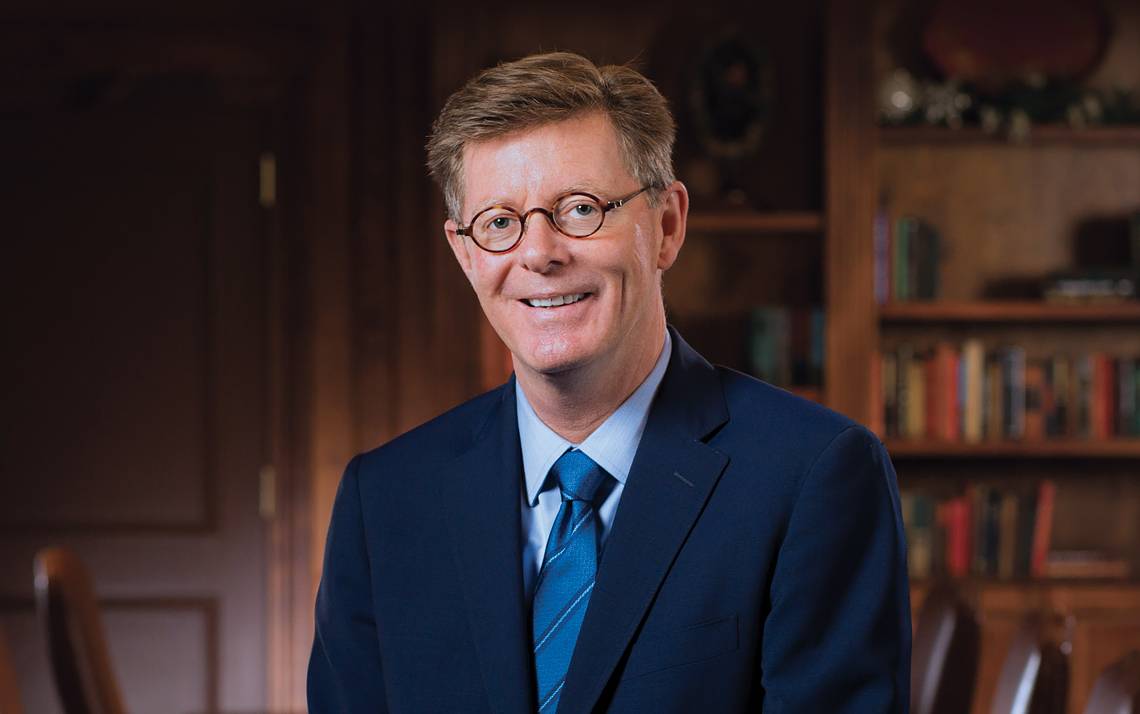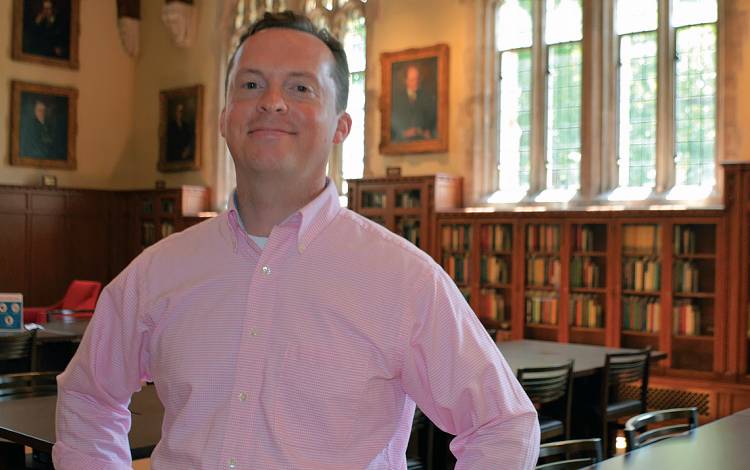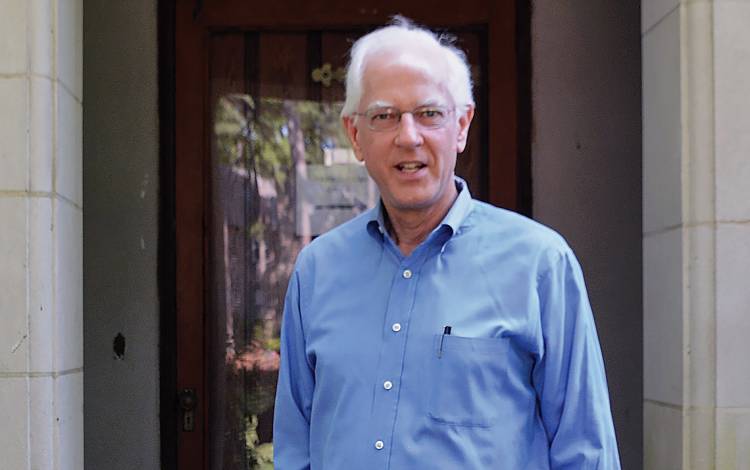A Conversation with Duke's New President
Price answers questions posed by Duke employees covering various topics

In high school, Vincent E. Price landed a summer job at a McDonald’s in Torrance, California.
He started on fries, moved to the grill and then handled maintenance duties, arriving at 2 a.m. for an eight-hour shift to empty grease traps and clean the restaurant.
Price preferred the schedule because it freed up his afternoons to enjoy the beach, but the job taught him about working with people.
“I did interact with a wide swath of people who came from very different backgrounds, young, old,” Price said. “I enjoyed the teamwork.”
Since then, Price, whose curriculum vitae spans 22 pages, has earned three degrees, held nearly 20 academic and research appointments and received 23 honors and awards. A leading expert on public opinion, social influence and political communication, Price has published scores of articles and the book, “Public Opinion,” which is in six languages.
And on July 1, Price – the former provost of the University of Pennsylvania – became Duke University’s 10th president.
We asked Duke staff and faculty to send us questions to help answer, “Who is Duke’s next president?” We learned his favorite Netflix binges include “The Wire” and “House of Cards.” He takes regular walks with his dogs, Scout, a Golden Doodle, and Cricket, a Labradoodle, and he loves enchiladas and huevos rancheros. The best advice he’s ever received? “You should marry Annette,” his wife.
And there’s much more. What follows is our conversation with Price covering various topics based on your questions and a few of ours.

Li-Chen Chin, assistant vice president, Intercultural Initiatives:
What are major challenges Duke will face in the next decade? What are your strategies for dealing with these challenges?
VP: Well, I suppose that one short-term challenge the Duke community will face is adjusting to a new president in the Allen Building, but I trust that will not prove major and will do all I can to help.
In a more serious vein, let me suggest three important challenges we face together, by way of three questions we should be asking ourselves:
Who are we? Our particular challenge at Duke – and our great opportunity as well – is to blaze a productive and exemplary path forward, to use knowledge in service to society as our great bonding agent, and to focus on inclusive inquiry from the broadest and most diverse range of perspectives. As a practical matter, this means cultivating a willingness to leave our comfort zones, individually and collectively, and engaging new ideas and new people – indeed, even those we may find in some ways problematic or objectionable – from a position of faith in each other and with mutual respect.
Where do we want to go together? No institution has climbed as quickly to international prominence as Duke, yet accelerating that trajectory will require careful choices. This is not the time or place for me to lay out a map with trails marked, but I do think some of the general directions will become clear as we identify priorities in the coming months.
How do we get there? We must have sustainable resources and business models to make good on our goals. Duke is in a very strong position, thanks in particular to the success of the Duke Forward campaign, but there are many hazards ahead, including the escalating costs of our educational and research programs, cutbacks in federal and state funding, and uncertainty in the economy.
I don’t have the answers, but I’m confident that we will find solutions through a combination of efforts: enhancing our strong record in philanthropy; being more focused and efficient with an eye toward reducing costs; doing a better job of translating and commercializing our research discoveries; and identifying innovative ways of deploying technology, especially in our educational programs.
Working@Duke Editor:
What’s the funniest anecdote related to your famous name?
VP: When I was in my first year of college, I lived on the same floor as Danny Thomas (also not the Danny Thomas). And I’ve received countless congratulations for my contributions to Michael Jackson’s “Thriller.”
I grew up number six out of eight siblings in my family and I have a number of older brothers. As a young child, when it became clear to me that there was another Vincent Price, because I would be greeted by comments about Vincent Price everywhere I went, I went to my mother and asked, ‘so what’s with this name Vince?’ She said, ‘Oh, your father and I always loved that name, Vincent.’”

Aaron Welborn, communications director, Duke Libraries:
I’d be interested to know what books or authors have most informed President Price’s daily life. What does he like to read when he wants to slow down and get perspective?
VP: In my reading tastes, I tend toward biography. For example, Ron Chernow’s “Titan,” “House of Morgan” or “Alexandar Hamilton,” and David McCollough’s many titles, or Edmund Morris’s fabulous Roosevelt trilogy. I also enjoy reading historical nonfiction, by authors such as Hampton Sides, Erik Larson, Candice Millard, and H.W. Brands (Shelby Foote’s three-volume “The Civil War” stands out as a favorite). I also like – perhaps no surprise here – historical fiction. I loved Iain Pears’s “An Instance of the Fingerpost,” Hilary Mantel’s “Wolf Hall” and “Bringing Up the Bodies” and Hella Haasse’s “In a Dark Wood Wandering.”
I also very much like reading fiction, and loved Richard Ford’s “Frank Bascombe” trilogy, but I gravitate decidedly to the historical in my reading. Thanks to generous Duke alumni who passed along great reading advice, I’ve recently enjoyed Robert Durden’s “The Dukes of Durham” and Earl Porter’s
“Trinity and Duke.”
Working@Duke Editor:
What's your leadership style?
VP: I’d like to think I’m a good listener, pragmatic and consultative by nature but unafraid to make decisions and hold to a course chosen after due deliberation. I’m also deeply inspired by my students and colleagues, and expect their work will in turn inspire others.
I think of three general leadership lessons I’ve learned over time. First, you need to know your culture. What do people in your community find inspiring? What do they most value? An authentic leader can help a community become a more perfect version of what it is. Second, you need to know your cause. Where should the organization go? What must be done to get there? In my experience, the best leaders don’t pursue their priorities, they pursue our priorities. Finally, you need to know your character. What are your strengths and weaknesses? What will it take to get the job done, and where will you find those competencies? To get smart, surround yourself with smart people. To get organized, surround yourself with organized people. To become a leader, surround yourself with opportunities, and move to seize them with better people than you by your side. I’m doing all these things in making the move to Duke.

Sarah Whitney, financial analyst, University Center - Activities:
Can you speak a bit about your commitment to the arts and your thoughts for Duke’s future in that realm?
VP: I am deeply committed to the arts, and I’m thrilled to be joining Duke in time for the opening of the new Arts Center. I recently had the opportunity to meet with the Council for the Arts to hear about the great work in our academic and presenting departments. I’m also impressed by the vibrant arts scene in Durham, which has received national acclaim. We can capitalize on this energy by encouraging even greater collaborations between our arts institutions and the academic programs in our schools and departments, particularly in the professional schools.

Gale Pettiford, staff assistant, Romance Languages:
Is there a particular time of day that you reserve for ‘thinking time’? A time to recharge and reflect?
VP: I like to carve out different types of ‘thinking time,’ each with its own purpose. In the morning, I try to make it into the office a few hours before my scheduled meetings begin to get organized, look ahead to the day, take stock about what needs to be done, and to revisit and update my to-do list of both short-term and long-term priorities. I find this time incredibly reinvigorating, because it gives me a certain peace of mind and clear sense of purpose as I head into a busy day. When I miss that time, I absolutely feel the difference it makes in my day – and it’s not a good difference.
My aspiration is to conduct meetings as productive time for thinking together. I’m reminded of something the sociologist Charles Horton Cooley wrote around the turn of the last century: Communication is ‘truly the outside or visible structure of thought, as much cause as effect of the inside or conscious life.’ We don’t often know what we think – at least I don’t – until we talk it through.
Then there is more reflective, unstructured time. For me, this is for reading, which I regularly do at night before turning in, or for writing. Experience has taught me that I’m much more productive before dinner than after.

Oscar E. Dantzler, utility worker, Housekeeping Operations:
Being at Duke for 20 years and two presidents, my question would center around your availability and visibility. Will you be the president that will interact with students and staff on a daily basis and also when possible have an open-door policy to all?
VP: I plan to be as visible as possible. With so many demands on a president’s time, this can be difficult; but we’ll just have to do it. There is no substitute for walking around and I look forward to visiting every corner of our campus. Likewise, I do feel strongly that every member of our community – faculty, staff, student, alumni, friend – should know that they have an approachable and available president who values what they have to say and who appreciates what they contribute to Duke.

Stuart Wells, administrative assistant, Office of News & Communications:
What are some of the next steps that we as a campus community can take to think more globally and become better connected with our existing international partnerships?
VP: Our goal continues to be bringing Duke to the world and the world to Duke. The best universities must not only ensure that their teaching and research programs convincingly address the needs of a globalized society; they must also support international flows of students and researchers, particularly as developing nations accelerate their investments in higher education and related infrastructure.
Perhaps our greatest asset is our incredible community of international students, faculty and staff. We already have a full range of opportunities to learn about international culture, history, development, health, business, and engineering that grows more impressive each day. A great example is the Duke Africa Initiative, which is not only advancing our partnerships in sub-Saharan Africa, but also building connections between departments and schools on campus around themes relevant to Africa, engaging African scholars and students, and creating more visibility for African art and culture.

Marnie Rhoads, director, Faculty Research Mentoring & Recognition:
What are ways that you feel you could impact our campus climate to ensure that all perspectives are heard and everyone is treated with the respect and dignity that we all deserve?
VP: While it’s sometimes said that 80 percent of success is showing up, making sure everyone feels valued and appreciated demands much more. I look forward to celebrating our accomplishments, thanking our staff and faculty for what they do, and sharing whatever difficult moments we may face together.
Even more important is talking with people, engaging them, soliciting their help, and listening carefully. A university is a unique and perhaps ideal setting to encourage open expression on the most pressing issues that face us, even – or especially – when they may seem difficult or uncomfortable to talk about.
I hope to find ways to promote constructive conversations, among as many people in our community as possible, and in ways both large and small, around issues that might otherwise divide us. We need to do all we can to promote Duke as a community grounded in mutual respect, dedicated to inclusion, and actively promoting an understanding of what it means to dignify each other and our work together.
Working@Duke Editor:
With your background in Communications, what work do you hope to accomplish about Duke messaging? What ideas and themes about this university do you hope to convey to the world? What might you consider changing about the messages we currently send? Do you hope to curb negative publicity and instead highlight the amazing things our community accomplishes?
VP: I do certainly plan to communicate as effectively and broadly as possible about all the amazing things Duke does. During the transition, I’ve met a number of outstanding communications and public affairs professionals here, and Duke’s very strong global reputation is in many ways a product of their excellent work. Our alumni are also incredibly effective ambassadors, constituting a global network perhaps unrivaled in its support of its alma mater.
If and when things do happen to go awry, which they will, we need to talk about them in honest and direct ways. At the same time, we need to ensure that the balance of publicity accurately represents what we know to be one of the world’s most accomplished and innovative universities.
Moving forward, we will likely need to be even more strategic in our communication efforts than in the past, given that our media systems are undergoing such dramatic transformations. We’ll need to ensure we are using social media effectively and building communities of interest around our work. We will need to be better coordinated than ever, identifying a few key themes and staying with them in a disciplined way. And we should continue to identify powerfully personal stories, wherever possible, that draw attention to those themes.

Sarah Zoubek, associate director, World Food Policy Center:
Duke launched a “Healthy Campus Initiative” to make Duke’s campus the healthiest campus in the nation and possibly the world. What suggestions would you have for this effort?
VP: I love the fact that Duke has set out a goal of being the healthiest university in the nation, and there are key ways we can promote a healthy Durham as well. I’m impressed not only by the vision, but also by the approach, which is grounded in a broad coalition of faculty and staff working to better leverage our many existing programs while looking for innovative ways to add to the repertoire of health and well-being programs.
I don’t have any definite suggestions to offer at this point, as various steering committees are ironing out the key goals. I can mention, however, a few themes I have tried to emphasize over the years in my work on campus with students and colleagues. These are also things I need to remind myself of with regularity, practicing being that much harder than preaching.
First, walk. Let’s take advantage of the fact that we work and live on one of the most beautiful campuses in the world, and get out of the office. Second, slow down. Students in particular take on so many extracurricular activities that little time is left for unstructured reflection or rest. We need to feed our souls with contemplative experience, and that means slowing down … and where better than in the Duke Chapel or Sarah P. Duke Gardens? Third, sleep. Few of us get enough sleep these days, myself included. We would do well to put down our cell phones and tablets, and hit the pillow like we hit the gym. Finally, moderation in all things. Except in cheering on the Blue Devils.

Natalie Spring, director of prospect research, management and analytics, Development Services:
Getting to know people who make the University what it is in the eyes of the Durham and North Carolina community might be the most fun aspect of your job. What’s your plan for getting to know the thousands of staff – not faculty – at Duke?
VP: We have been so warmly welcomed by the Duke and Durham communities already. My plan for getting to know people is pretty simple: getting out and around. There will be plenty of meetings, but what I most look forward to is the chance to say hello, ask people about their experiences at Duke, learn about what brought them here, and to thank them for being a part of our community.
I’m especially looking forward to meeting our staff. One of the great joys of my job is getting to know the diverse and talented array of people who work, day in and out, to make Duke a great place. Our students and faculty are often unaware of all it takes to keep the university running so well. As a colleague once said, it’s as though somebody pulls a curtain aside, and you see this marvelous world of extraordinarily talented and dedicated staff members running the machine, behind the scenes, keeping everything moving in synchrony.